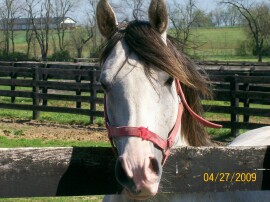Equine - Timely Topics
Stallion Behavior
By Dr. Lynda Miller
 We all know that working with stallions can be an intimidating and challenging issue. Although most stallion owners are concerned with their stallions displaying sexual behaviors at inappropriate times, stallions can also have problems learning to display sexual behaviors at appropriate times. I would like to briefly discuss both suppressing and stimulating sexual behaviors in stallions, and a few ways your veterinarian may be able to help you with these issues.
We all know that working with stallions can be an intimidating and challenging issue. Although most stallion owners are concerned with their stallions displaying sexual behaviors at inappropriate times, stallions can also have problems learning to display sexual behaviors at appropriate times. I would like to briefly discuss both suppressing and stimulating sexual behaviors in stallions, and a few ways your veterinarian may be able to help you with these issues.
While trying to use stallions for competitive or recreational purposes, owners may want to suppress sexual behavior. Behaviors should be address when the stallion has become aggressive or is distracted during his “work”. It is completely normal for a stallion to obtain erections on a fairly regular basis while in his stall or paddock, and this behavior should not be reprimanded. Reprimanding a stallion for this normal behavior may, in contrast, cause it to happen more frequently.
The best approach to a stallion with a behavior problem starts with patience and short training sessions. If the stallion is too aggressive, your veterinarian may choose to begin these training sessions with some calming drugs such as valium. The time needed to achieve success with this method is dependent entirely upon the stallion. He should never be rushed. This method may take a fair amount of time and patience to achieve, but you and your stallion will be happy with the results.
A vaccination against GnRH has been used with some success in younger stallions, but only works in a small percentage of mature stallions. The GnRH vaccine causes a decrease in negative behaviors, but also renders the stallions infertile. Although most stallions return to fertility, the reversal of the infertility can be questionable. The GnRH vaccine should be used with caution in stallions that have a future in breeding.
Some methods that are inappropriate and unacceptable from an animal welfare standpoint include: electrical shock, penile rings, and wire brushes. The electrical shock has been shown not to change sexual behaviors and, in contrast, seems to increase the frequency of these behaviors. The penile rings prevent erections by not allowing blood to flow into the penis. The penile rings can cause scarring and constrictions which causes pain and erectile issues when trying to breed the animal. The wire brushes are placed on the stallions abdomen and cause the stallion to associate pain with an erection and may also cause scarring and constrictions of the penis. All of these methods teach the stallion to associate pain with erection, thereby causing the stallion not to get an erection when one is desired for breeding purposes. If any of these methods have been used on your stallion, the negative side effects may be reversible, but it will take a lot of time and patience.
Low libido is one of the more common complaints in breeding stallions. A full physical examination should be performed to rule out any physical reasons for the problem first. There are many physical reasons for low libido in stallions, and the discussion of these is beyond the scope of this article. Once a full physical examination has been completed with no evidence of a problem, the stallion should be treated with patience and short training sessions with an experienced estrus mare. If a stallion is still nervous and/or distracted, your veterinarian may choose to use some valium and/or GnRH. The valium would be used to relax the stallion and allow him to concentrate more on the matter at hand than any distractors that may be happening around him. The GnRH can enhance libido in the stallion and aid in ejaculation. Either or both of these treatments should only be needed on a very limited basis (usually only once or twice) since a successful breeding is a very powerful positive reinforcement to continued success! The stallion’s problem can even be as simple as having a preference for a different mare.
I hope this dispels some questions you may have about stallion behaviors. If you have any questions, contact your veterinarian or the VHC for further assistance.